Regulierung internationaler Finanzmärkte und Banken
Die Forschungsgruppe "Regulierung internationaler Finanzmärkte und Banken" analysiert internationale Kapitalströme und die Auswirkungen von Regulierungsänderungen auf die Finanzstabilität. Integrierte Finanzmärkte begünstigen eine effiziente Kapitalallokation und Risikoteilung – sie erleichtern aber auch die grenzüberschreitende Übertragung von Schocks.
Dementsprechend hat sich die Bankenregulierung in den letzten Jahren weiterentwickelt, wobei die vollen Auswirkungen dieser Reformen noch unklar sind. Daher konzentriert sich die Forschung der Gruppe auf zwei Bereiche:
Erstens werden die Haupttreiber internationaler Kapitalströme und deren Auswirkungen auf Finanzstabilität untersucht. Zeiten hoher Finanzintegration sind oft gefolgt von Krisen mit nachhaltigen realwirtschaftlichen Folgen. Ziel ist es, zu verstehen, wie eine stabile und effektive Kreditvergabe gewährleistet werden kann.
Zweitens wird untersucht, wie sich Veränderungen in der Regulierung und Aufsicht auf das grenzüberschreitende Bankgeschäft auswirken, insbesondere im Kontext der europäischen Integration. Dazu gehört die Bewertung des Trade-offs zwischen regulatorischer Harmonisierung und unbeabsichtigten Marktverzerrungen.
Zwei Datenprojekte tragen zu diesen Forschungsthemen bei: die International Banking Library, eine webbasierte Plattform für den Forschungsaustausch mit einem vierteljährlichen Newsletter, der mehr als 700 Abonnenten erreicht, und die Financial Markets Directives Database, die die Umsetzung der wichtigsten EU-Vorschriften im Bereich Finanzmärkte mit besonderem Schwerpunkt auf der Europäischen Bankenunion dokumentiert. Gemeinsam fördern sie eine evidenzbasierte Politikanalyse und erhöhen die Sichtbarkeit der Gruppe.
Forschungscluster
Wirtschaftliche Dynamik und StabilitätIhr Kontakt

- Abteilung Finanzmärkte
PROJEKTE
10.2021 ‐ 06.2025
Distributional Effects of Macroeconomic Policies in Europe (DEMAP)
Leibniz-Gemeinschaft
Das Projekt untersucht wie politische Maßnahmen auf dem Level der Europäischen Union, wie zum Beispiel der European Recovery Fund, die Ungleichheit zwischen Haushalten beeinflusst.
07.2017 ‐ 12.2022
Die politische Ökonomie der europäischen Bankenunion
Europäischer Sozialfonds (ESF)
Ursachen für nationale Unterschiede in der Umsetzung der Bankenunion und daraus resultierende Auswirkungen auf die Finanzstabilität.
01.2015 ‐ 12.2017
Dynamic Interactions between Banks and the Real Economy
Deutsche Forschungsgemeinschaft (DFG)
Referierte Publikationen

Financing Choice and Local Economic Growth: Evidence from Brazil
in: Journal of Economic Growth, Nr. 3, 2021
Abstract
We study how financing non-traditional local activities, conceived here as a proxy for activity diversification, is associated with economic growth. We use municipality-level data from Brazil, a country with large geographical, social, and economic disparities observed across its more than 5500 municipalities. We find that finance to non-traditional local activities associates with higher municipal economic growth, suggesting a positive externality between the non-traditional and traditional sectors. Using large natural disasters in Brazil as sources of unexpected negative events, we find that this association between financing non-traditional local activities and economic growth becomes negative in times of distress. We find that traditional local sectors are more affected than non-traditional sectors following a natural disaster. Precisely because of the non-traditional sector’s dependence on the traditional sector, our results suggest that municipalities should restrengthen their traditional activities during adverse conditions.

The Impact of Risk-based Capital Rules for International Lending on Income Inequality: Global Evidence
in: Economic Modelling, May 2021
Abstract
This paper investigates the impact of international bank flows from G10 lender countries on income inequality in 74 borrower countries over 1999–2013. Specifically, we examine the role of international bank flows contingent upon the Basel 2 capital regulation and the level of financial market development in the borrower countries. First, we find that improvements in the borrower country risk weights due to rating upgrades under the Basel 2 framework significantly increase bank flows, leading to improvements in income inequality. Second, we find that the level of financial market development is also important. We report that a well-functioning financial market helps the poor access credit and thereby reduces inequality. Moreover, we employ threshold estimations to identify the thresholds for each of the financial development measures that borrower countries need to reach before realizing the potential reductions in income inequality from international bank financing.
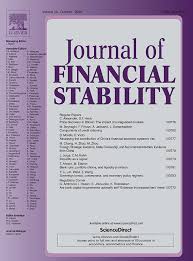
Consumer Defaults and Social Capital
in: Journal of Financial Stability, April 2021
Abstract
Using account level data from a credit bureau, we study the role that social capital plays in consumer default decisions. We find that borrowers in communities with greater social capital are significantly less likely to default on loans, even after adjusting for different levels of income and other characteristics such as credit scores. The results are strongest for potentially strategic defaults on mortgages; a one standard deviation increase in social capital reduces such defaults by 12.4 %. These results can be generalized to any mortgage default. Our results also indicate that the effect of social capital is most prominent among more creditworthy borrowers, suggesting that when given a choice, the social cost of defaulting is an important factor affecting default decisions. We find a similar impact of social capital on consumer defaults in other datasets with more detailed information on borrowers as well. Our results are robust to modeling and methodology choices, as well as controlling for other drivers of default such as wealth, income and amenities from homeownership. Our results suggest that increasing social capital via measures to build community cohesion such as promotion of owner-occupied home ownership may be one avenue to deter consumer default.

Do Affiliated Bankers on Board Enhance Corporate Social Responsibility? US Evidence
in: Sustainability, Nr. 6, 2021
Abstract
In this study, we examine whether and to what extent affiliated bankers on board may affect firms’ corporate social performance. Using a propensity score-matched sample from 2002 to 2016, we find that board directors from affiliated banks exert significantly positive influence on firms’ corporate social performance. Furthermore, board of directors from affiliated banks are negatively associated with firm investments in corporate social responsibility (CSR) activities when firms experience financial distress. Finally, we find that the effect of affiliated bankers on board on firms’ CSR performance depends on the affiliated banks’ CSR orientation, as affiliated banker directors from banks with higher CSR orientation have a stronger influence on firms’ investments in CSR activities. The results suggest that improving firm’s CSR performance is consistent with the affiliated banks’ interests.
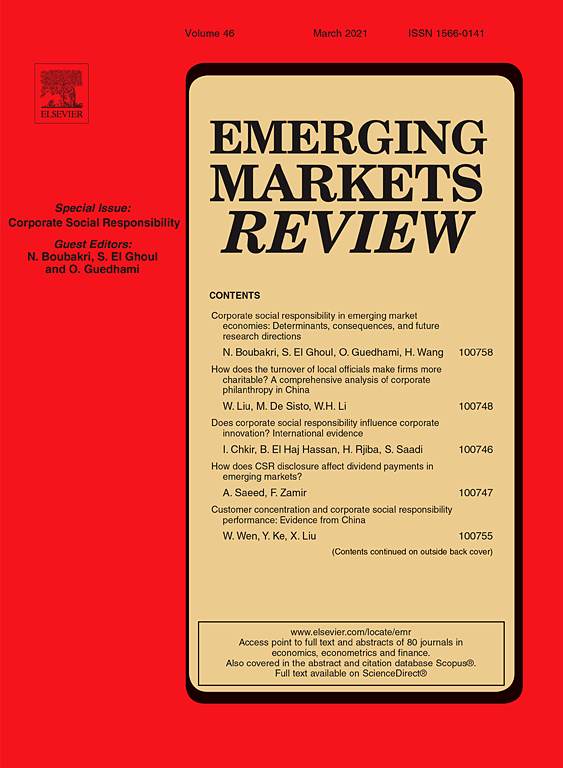
Who Benefits from Mandatory CSR? Evidence from the Indian Companies Act 2013
in: Emerging Markets Review, March 2021
Abstract
We examine the value impact of mandatory Corporate Social Responsibility (CSR) spending required by the Indian Companies Act of 2013 for large and profitable Indian firms. We find that the external mandate is value decreasing, even after controlling for prior voluntary CSR activity by firms affected by the mandate. We also find that there is systematic crosssectional variation across firms. Firms that are profitable and firms in the Fast Moving Consumer Goods sector that voluntarily engaged in CSR, benefit from CSR. Industrial firms and firms with high capital expenditures are negatively impacted by the mandate. We conclude that a one-size-fits-all approach to CSR is sub-optimal and value decreasing.
Arbeitspapiere
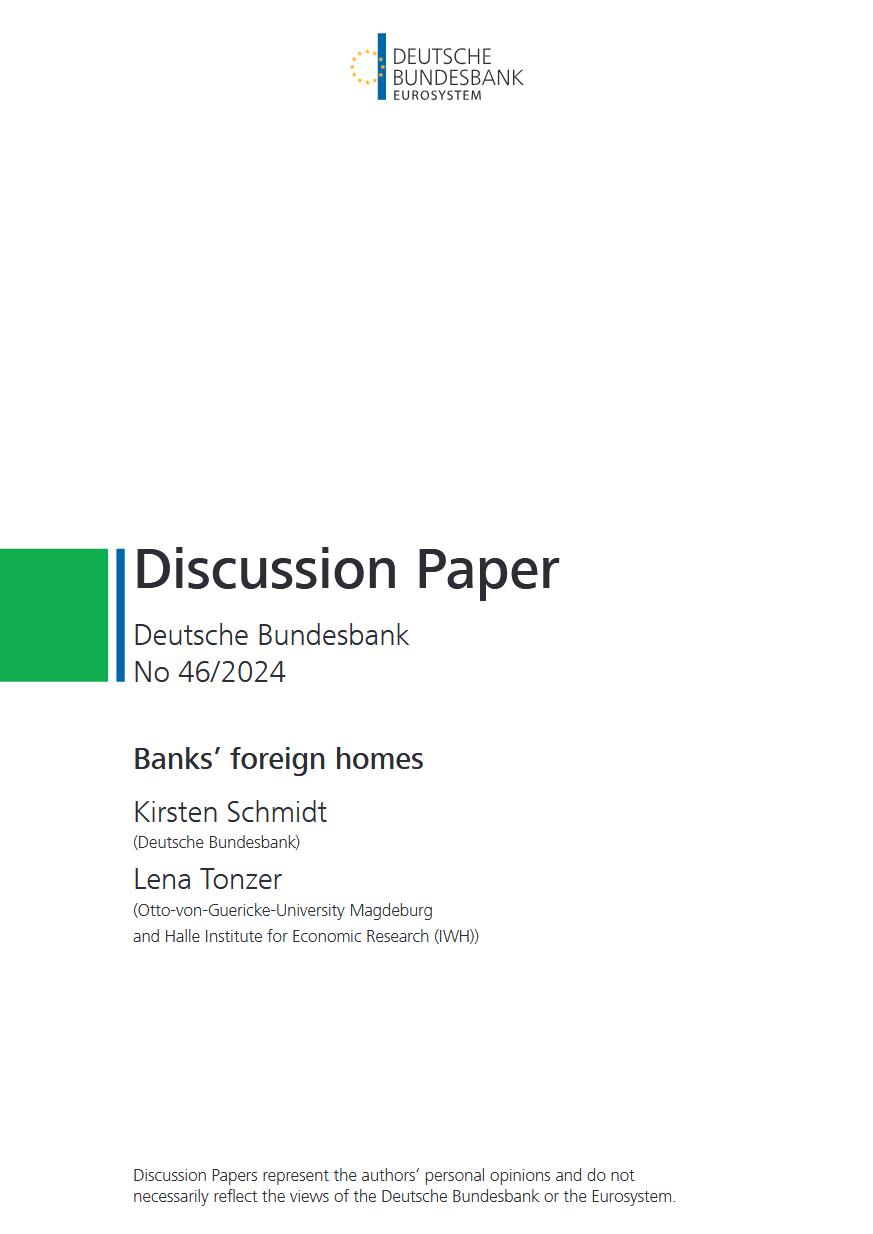
Banks’ foreign homes
in: Deutsche Bundesbank Discussion Papers, Nr. 46, 2024
Abstract
<p>Our results reveal that higher lending spreads between foreign and home markets redirect real estate backed lending towards foreign markets offering a higher interest rate, which provides evidence for "search for yield" behavior. This re-allocation is found especially for banks with more expertise on the foreign market due to a higher local activity and holds for commercial and residential real estate backed loans. Furthermore, "search for yield" behavior and a resulting increase in foreign real estate backed lending is found when macroprudential regulation is missing or misaligned between a bank’s country of residence and the destination country. When turning to the question of whether the detected search for yield behavior results in more risk, we find that especially better capitalized banks report higher forbearance ratios as they might face less stigma effects compared to low capitalized banks.</p>
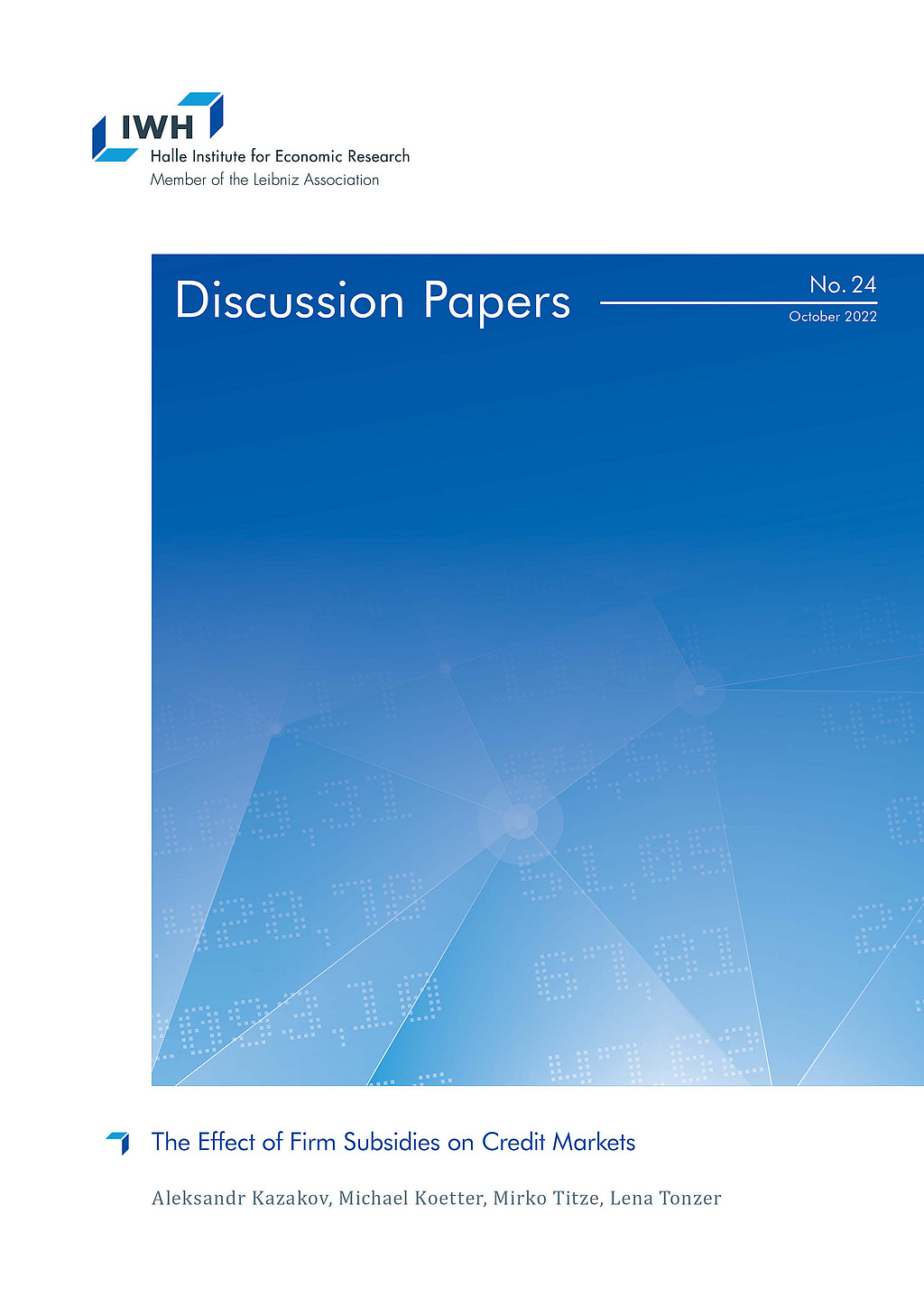
The Effect of Firm Subsidies on Credit Markets
in: IWH Discussion Papers, Nr. 24, 2022
Abstract
<p>We use project-level information for the largest regional economic development program in German history to study how government subsidies to firms affect credit markets. We identify credit market responses by considering both, bank lending and firm borrowing during 1998-2019. We find that subsidies lead to larger lending volumes without crowding out credit to non-subsidized firms. Banks that are more exposed to subsidized firms exhibit moderately higher credit risk though. Firm subsidies support lending especially when credit constraints are elevated during the years of the financial crisis.</p>
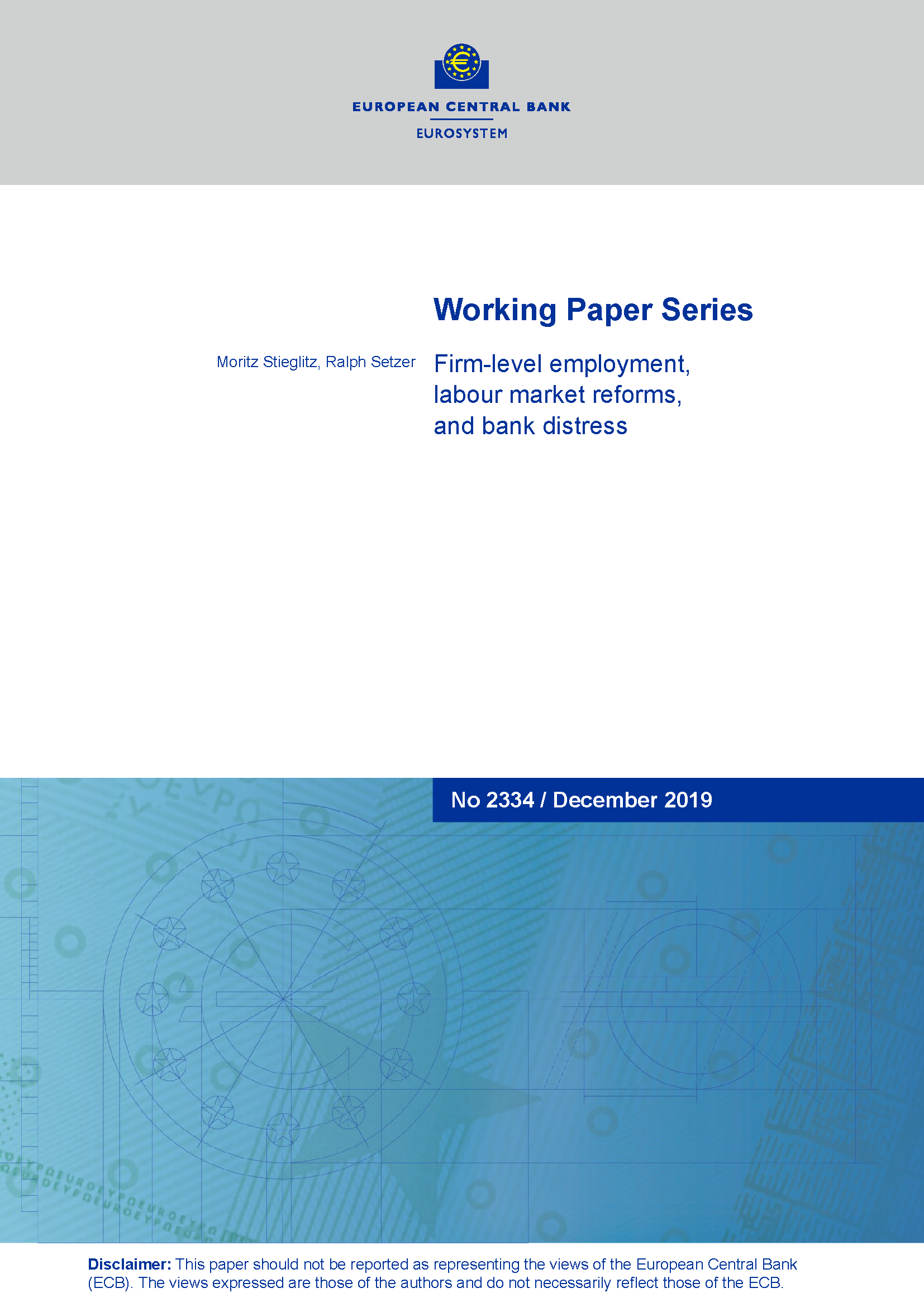
Climate Change-Related Regulatory Risks and Bank Lending
in: ECB Working Paper, Nr. 2670, 2022
Abstract
We identify the effect of climate change-related regulatory risks on credit real-location. Our evidence suggests that effects depend borrower's region. Following an increase in salience of regulatory risks, banks reallocate credit to US firms that could be negatively impacted by regulatory interventions. Conversely, in Europe, banks lend more to firms that could benefit from environmental regulation. The effect is moderated by banks' own loan portfolio composition. Banks with a portfolio tilted towards firms that could be negatively a affected by environmental policies increasingly support these firms. Overall, our results indicate that financial implications of regulation associated with climate change appear to be the main drivers of banks' behavior.
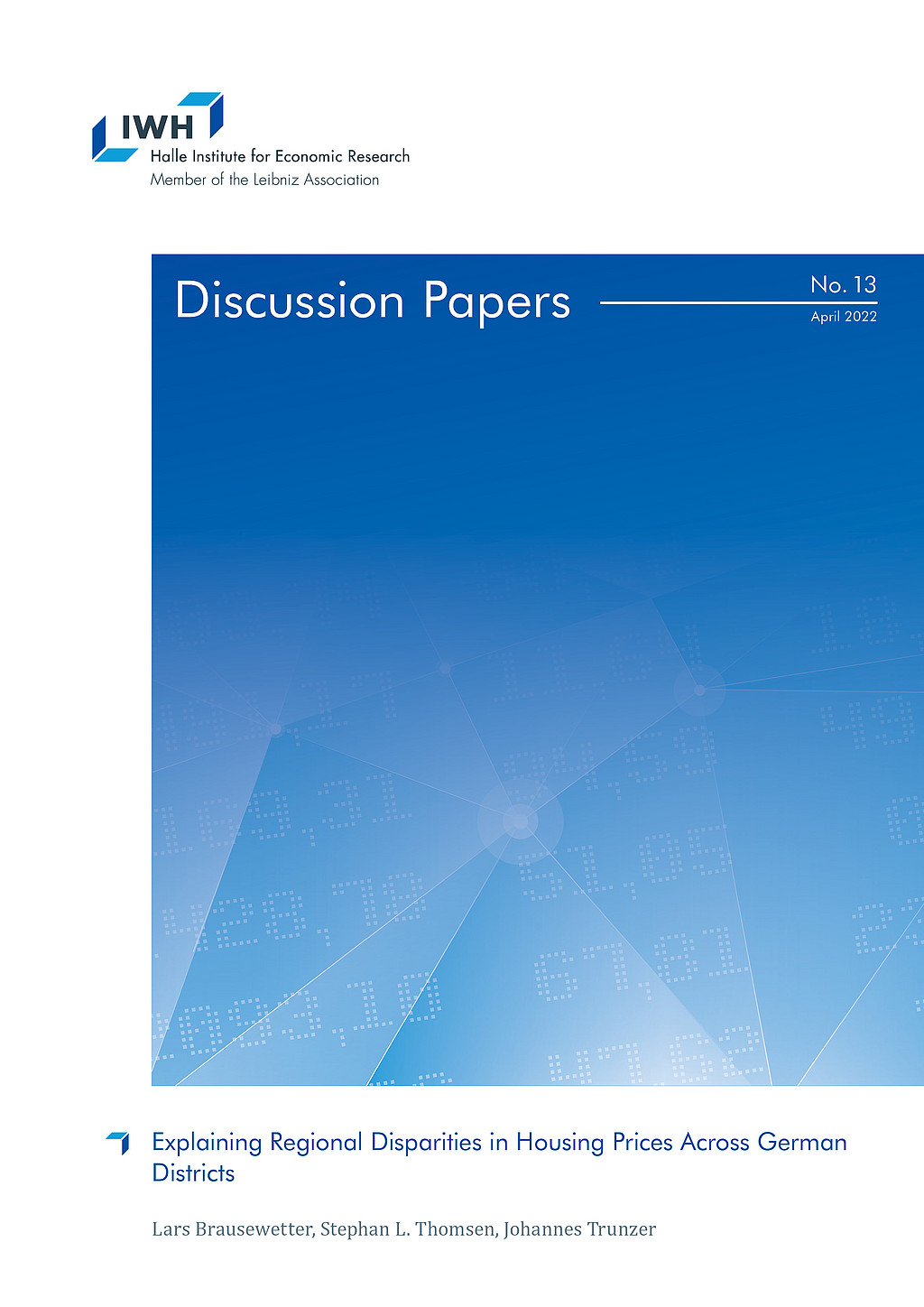
Explaining Regional Disparities in Housing Prices Across German Districts
in: IWH Discussion Papers, Nr. 13, 2022
Abstract
Over the last decade, German housing prices have increased unprecedentedly. Drawing on quality-adjusted housing price data at the district level, we document large and increasing regional disparities: Growth rates were higher in 1) the largest seven cities, 2) districts located in the south, and 3) districts with higher initial price levels. Indications of price bubbles are concentrated in the largest cities and in the purchasing market. Prices seem to be driven by the demand side: Increasing population density, higher shares of academically educated employees and increasing purchasing power explain our findings, while supply remained relatively constrained in the short term.
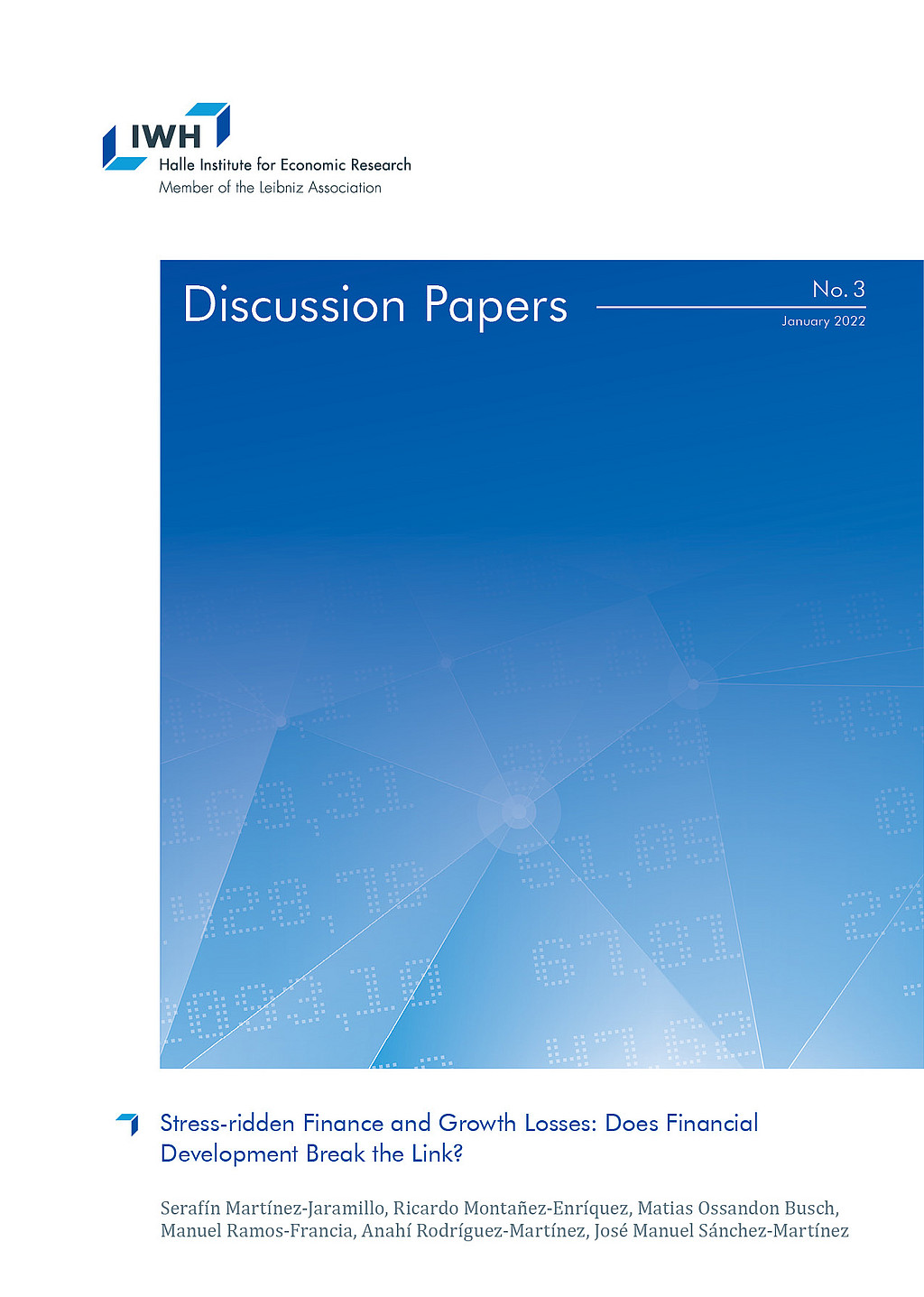
Stress-ridden Finance and Growth Losses: Does Financial Development Break the Link?
in: IWH Discussion Papers, Nr. 3, 2022
Abstract
Does financial development shield countries from the pass-through of financial shocks to real outcomes? We evaluate this question by characterising the probability density of expected GDP growth conditional on financial stability indicators in a panel of 28 countries. Our robust results unveil a non-linear nexus between financial stability and expected GDP growth, depending on countries’ degree of financial development. While both domestic and global financial factors affect expected growth, the effect of global factors is moderated by financial development. This result highlights a previously unexplored channel trough which financial development can break the link between financial (in)stability and GDP growth.















